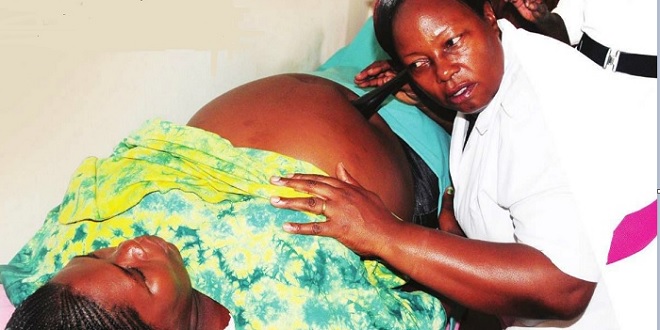
Could it be the missing link to finally addressing Uganda’s persistently high maternal deaths?
COMMENT | JOY ASASIRA | April is Maternal Health Month and, as we commemorate it, we must be aware that not a day goes by that we do not hear of a mother somewhere in Uganda who has lost her life (and many times that of her baby) while delivering.
According to the Uganda Bureau of Statistics (UBOS) key indicators report for the sixth Demographic and Health Survey 2016, up to 336 mothers die per 100,000 live births. Although it is a marked decline from 438 deaths per 100,000 live births registered in the 2011, the numbers of mothers dying remains too high.
In many of the local dialects in Uganda, there is a word to describe maternal death. To say the least, this has been accepted as “NORMAL”. But should it be?
The factors that lead to maternal death are known. They include socio-economic, cultural, and accessibility factors and the actual quality of care in health facilities.
These contribute to what have been referred to as the three delays. These include; delay of women at home in making the decision to seek care, delay by the women to identify and reach the medical facility, and finally delays at the health facility for the woman before receiving adequate and appropriate treatment.
Whereas the first and second delays are complex to address owing to the need for attitudinal shifts, economic empowerment, and eradication of deeply rooted cultural practices, interventions to curb the third delay are clear.
Delays at the health facility for the woman before receiving adequate and appropriate treatment happens because the facilities are poorly equipped; they lack health workers, medicines, equipment, and blood for transfusion. All these can be addressed through financing of systemic and programmatic interventions of healthcare, particularly maternal healthcare.
The non-affordability of maternal health services could, however, be a major reason our women continue to die from preventable maternal mortality causes.
It is, unfortunately, a common practice that when they face complications related to pregnancy or delivery, many women continue to choose high risk options like delivering at home or with the assistance of traditional birth attendants.
Ensuring affordable, accessible, acceptable, and good quality healthcare for Uganda’s women of reproductive age is an imperative if we are to tackle the persistently high maternal mortality.
The reality is that many Ugandans are just getting by economically and that, whenever two of them jump out of poverty, three fall back into it. Since reproduction is not a reserve of those with means, those living in poverty also find themselves pregnant and in need of good quality and dignified maternal care. This means that of the more than two million pregnancies in Uganda annually, many of these happen to women that are living below the poverty line (and these same women probably already have more children than they can care for).
Let us not forget about our teenage girls. One in four of these girls have either given birth or been pregnant before their nineteenth birthday and most cannot afford the healthcare that they desperately need.
It is not a surprise that the media is awash with stories of women giving birth in taxis, at the entrance of hospitals, in corridors, and on floors. There is also a new practice of detention of women in health facilities due to their failure to clear the medical bills.
The high cost of healthcare is forcing women to make life threatening decisions about how to manage their pregnancies and where to deliver. This high cost must be addressed through Universal Health Coverage.
Simply put, Universal Health Coverage (UHC) refers to ensuring access to health services for all without exposing the user to financial hardship. This is not to say that UHC is a silver bullet. It could, however, be one more step towards accessibility of healthcare including maternal health services and family planning.
The UHC is implemented through a multi-pronged approach that includes investing in primary health care where issues like malaria in pregnancy could be addressed. Secondly, through building and strengthening partnerships between the public and private sector. This includes regulating the operations of the private sector; including the pricing of services. Thirdly, creation of innovative financing models like Uganda’s proposed National Health Insurance scheme. These must be designed to overcome the shortfalls in a health system that is plagued by inequalities in access to and distribution of health facilities between the rural and urban areas and disparities in staffing levels between facilities at the same level in different parts of the country.
There are lessons to be learned from countries like Rwanda that developed and is currently implementing the Community Based Health Insurance (CBHI) scheme; where the population is scaled based on their income and then those considered the poorest and vulnerable are subsidised. It is no wonder Rwanda was able to achieve Millennium Development Goal 5A, which was to reduce maternal mortality by 75 percent between 1990 and 2015. Rwanda reduced its maternal mortality ratio by 78% from 1,300/100,00 live births to 567/100,00 live births in 2005 and 290/100,000 live births in 2015. It is also not surprising that the most significant changes in Rwanda were registered in rural areas where women have embraced best practices like facility-based birth as opposed to home births.
The cost of health services will continue to influence women’s choice of whether to seek healthcare during pregnancy and also skilled attendance at birth. With the number of women living in abject poverty increasing, the need for government and stakeholder interventions to ensure access to healthcare without the fear of facing financial hardship becomes a pertinent issue for consideration in order to ensure improved maternal and child health outcomes in Uganda.
*****
Joy Asasira is a women’s health advocate working at the Center for Health Human Rights and Development in Kampala.
 The Independent Uganda: You get the Truth we Pay the Price
The Independent Uganda: You get the Truth we Pay the Price



